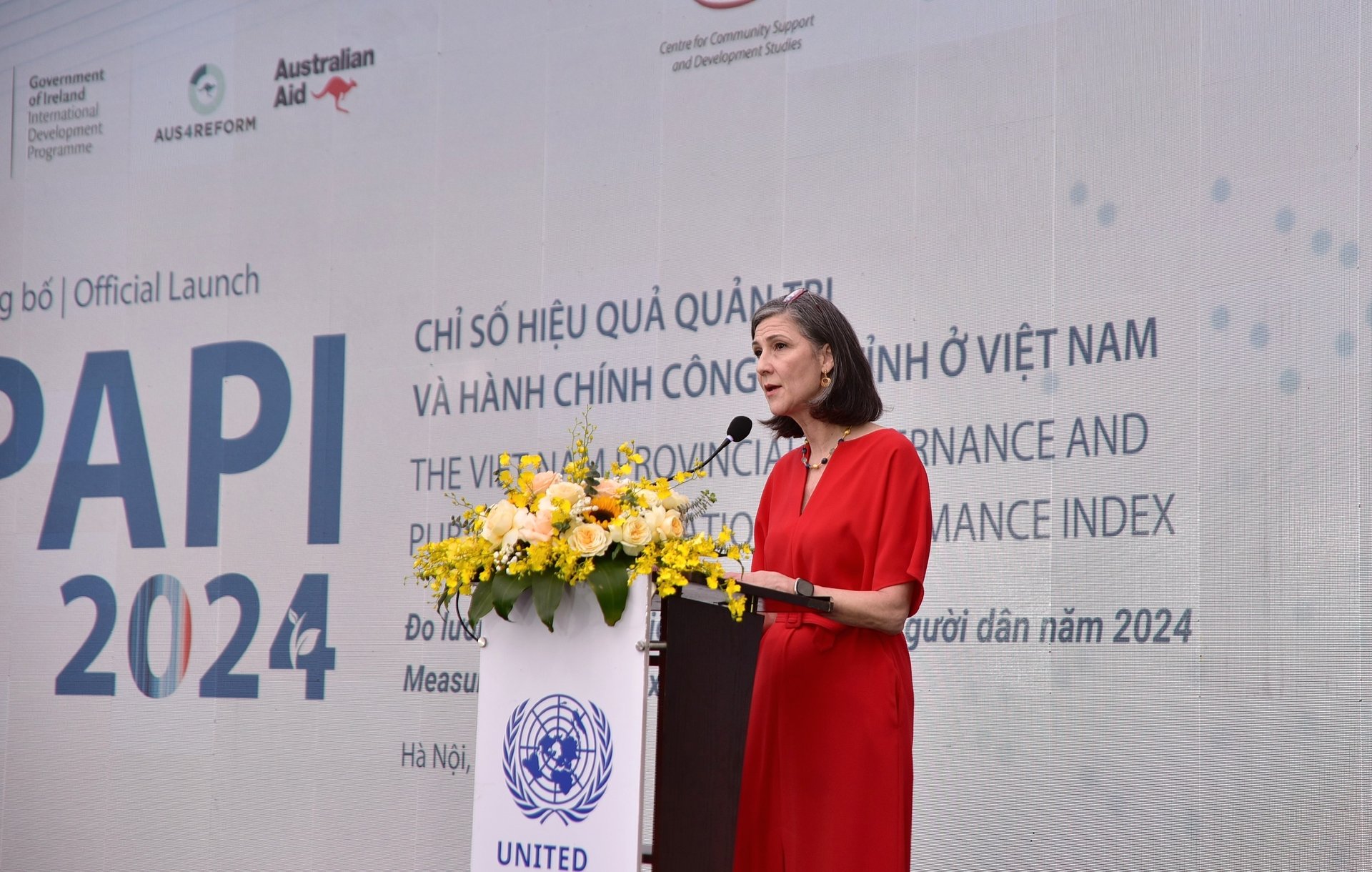December 1, 2025 | 09:49 GMT +7
December 1, 2025 | 09:49 GMT +7
Hotline: 0913.378.918
December 1, 2025 | 09:49 GMT +7
Hotline: 0913.378.918
On the morning of April 15, the launch ceremony for the Vietnam Provincial Governance and Public Administration Performance Index (PAPI 2024) took place at the United Nations headquarters in Hanoi.
The PAPI Index is the result of an annual collaborative research effort between the Centre for Community Support and Development Studies (CECODES), Real-time Analytics (RTA), and the United Nations Development Programme (UNDP) in Vietnam. Since 2009, the survey’s fieldwork has been coordinated with the support of agencies within the Vietnam Fatherland Front system, from central to grassroots levels.
The 16th edition of the PAPI Index reflects the views of 18,894 citizens randomly selected from across the country. The report offers in-depth analysis of various aspects of governance, public administration, and the delivery of public services in Vietnam.

According to Mrs. Ramla Khalidi, UNDP Resident Representative in Vietnam, the 2024 PAPI Index is highly valuable for all levels of government and sectors, aiming to foster effective and efficient local governance that serves the people and ensures no one is left behind. Photo: Kieu Chi.
In her opening remarks at the launch ceremony, Mrs. Ramla Khalidi stated: “The 2024 PAPI Index comes at a crucial time for the country, as Vietnam is undergoing institutional reforms and streamlining its administrative apparatus. The findings from the PAPI 2024 survey provide valuable data for all levels and sectors of government, to ensure that upcoming changes contribute to a local governance system that is effective, efficient, people-centered, and leaves no one behind.”
The 2024 PAPI Index delves into and highlights the increasingly vivid experiences and perceptions of citizens regarding climate risks over the past year. As climate change becomes more evident, the sense of vulnerability among the general population has risen by nearly 40%, with many reporting that their families or communities were directly affected by extreme weather events during the year.
The report also reflects citizens’ growing concerns over economic uncertainty in the future, largely due to significant gaps in social insurance coverage.
In addition, it reveals disparities in people’s experiences and perceptions, particularly among women, ethnic minorities, temporary residents, and those living in rural, remote, and mountainous areas, who report lower levels of satisfaction with the effectiveness of governance and public services compared to other population groups.

MA. Do Thanh Huyen, Public Policy Analyst at UNDP Vietnam, presented the key findings of the 2024 PAPI Index. Photo: Kieu Chi.
According to Ms. Do Thanh Huyen, UNDP Vietnam’s representative, the report reveals that citizens are more satisfied with the effectiveness of public governance and administration in 2024. While notable progress has been made, there remains considerable room for further improvement in public governance overall.
The 2024 PAPI Index particularly highlights improvements in several key areas, including: Transparency in local decision-making, Control of corruption in the public sector, Environmental governance, and E-governance.
Among these, corruption emerged as the most pressing concern for citizens in 2024. A significant 22.58% of survey respondents identified corruption as a critical issue that the government should prioritize addressing, an increase of 17% compared to 2023.
Although Vietnam achieved a 7.09% economic growth rate in 2024, there are still deep concerns about household economic conditions, especially among vulnerable population groups. Differences in satisfaction levels with the effectiveness of local governance persist among groups categorized by gender, ethnicity, household registration type, and area of residence. The digital divide remains a challenge, particularly in terms of access to and use of the internet and e-government services, across gender groups, between the Kinh majority and ethnic minorities, and between urban and rural areas.
Mrs. Renée Deschamps, Chargé d'Affaires at the Australian Embassy in Vietnam, stated: "Australia highly values the efforts of UNDP and domestic partners in developing and advancing the PAPI Index. PAPI serves not only as an evidence-based tool to support policymaking, but also as a platform for dialogue between citizens and local governments to improve the performance of local administrative systems. The PAPI Index increasingly demonstrates its relevance and valuable contribution to the Vietnamese Government’s process of reorganizing provincial-level administrative units."
The Department of Foreign Affairs and Trade of Australia (DFAT), the Embassy of Ireland in Vietnam, and the United Nations Development Programme (UNDP) in Vietnam have co-funded the PAPI research program since 2018.
Translated by Kieu Chi

(VAN) The inevitable path forward is to reorganize production along the value chain, utilizing cooperatives as the core, enterprises as the driving force, and farmers as the central subjects.

(VAN) On November 28, Minister Tran Duc Thang, together with China's Minister of Agriculture and Rural Affairs Han Jun, chaired the 2nd meeting of the Viet Nam - China Agricultural Cooperation Committee.

(VAN) Forest carbon credits are only accepted when they ensure absolute environmental integrity, additionality, permanence, and transparency.

(VAN) Viet Nam partners with Beijing on controlling air pollution, cross-regional management, high-tech monitoring and relocating polluting facilities.

(VAN) With a USD 50 million investment, Australia is partnering with Viet Nam to operate its first public electric bus fleet and develop a nationwide EV charging network.

(VAN) On November 28, in Beijing, Minister Tran Duc Thang met Minister of Ecology and Environment of China Huang Runqiu, to share experience on environmental protection.
/2025/11/28/0950-2-120557_751.jpg)
(VAN) The recent flood spell in the South Central region clearly reflects the characteristics of natural disasters in 2025, which are compound, prolonged, and amplified.